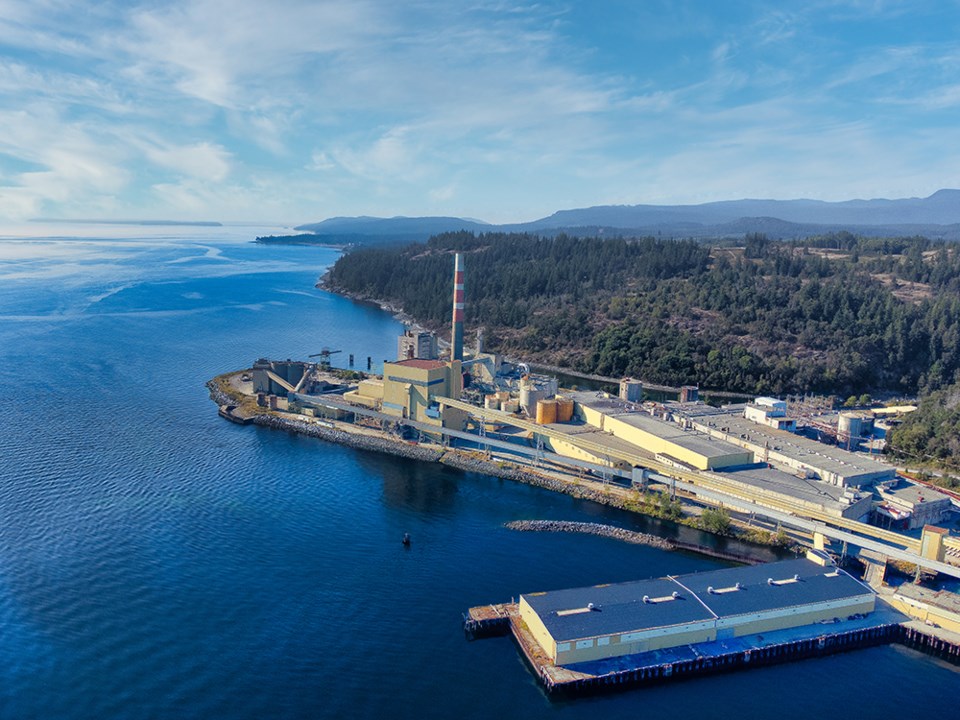City of Powell River Council voted in favour of establishing a $1.6 million reserve fund from expected additional funds this year from Catalyst Paper Tis’kwat mill’s tax assessment.
At a special council meeting held on January 23, councillors received a report from city chief financial officer Mallory Denniston, who provided an overview of the mill’s tax assessment for 2024.
Denniston said 92 per cent of the city’s assessment is residential, six per cent is business class and two per cent is major industry. She said the 2024 completed roll, which came out in January, will be updated with revisions in April to reflect any changes to the property values through the appeal process.
“After the city sets the total property tax revenue required to operate, the revised roll is then used to set property tax rates, which determine how the property tax burden will be distributed across property classes,” said Denniston.
She said the non-market decrease this year in major industry (Catalyst mill) classification is 34 per cent. According to Denniston, the assessment has decreased from $114 million to $82 million for major industry, from 2023 to 2024.
“This has been due to the change in status of going from indefinitely curtailed to permanently closed,” said Denniston. “As a result, BC Assessment takes a look at the folio and depreciates some of the improvements that are no longer operating.”
Denniston said the power operating capacity at the mill site was not depreciated because it is still operating, so that’s good news.
She said 2024 is the first year of the expiration of the mill’s revitalization tax exemption, which was a bylaw that provided the mill a tax discount to help keep it operating.
“This means there’s no cap on the revenue from that major industry,” said Denniston. “That means there would be a shift from roughly $3.3 million from major industry to $5 million in 2024, even though the value of the property has gone down. That’s an increase of about $1.6 million.
“It shifts the tax burden away from the other property classes. The recommendation is to set up a property tax stabilization reserve, increase the property taxes by a further $1.6 million, and then transfer this $1.6 million into that reserve. It’s simply there as a savings program to dip into should the assessment of the mill change.”
Reserve reduces risk
While the mill is producing $5 million in 2024 property tax, there are many risks to the assessment, said Denniston. The mill assessment could be appealed and that process could be lengthy, she added. The future owners could also decide to take it out of the major industry class, starting an industry there of much lower value than the previous industry.
“We are at a point in time where we don’t have any information into what direction the mill assessment will go,” said Denniston. “It’s a very high risk to the taxpayers if we don’t create a stabilization reserve, and in 2025, we see a dip in the assessment for the mill property. The property tax stabilization reserve would be there to smooth out that potential risk.”
Denniston recommended that staff be directed to establish a property tax stabilization reserve fund, increase the 2025 property tax revenue by $1.6 million, and transfer the $1.6 million increase in property tax revenue to the property tax stabilization reserve fund.
In her report to council, Denniston said it was a savings program to protect taxpayers from volatility in their property taxes.
The second option was to establish a property tax stabilization reserve fund and transfer $1.2 million into the reserve fund, easing the property tax burden for other taxpayers.
The third option was to not increase the 2024 property tax revenue, easing the 2024 property tax increase for an average single-family dwelling by nine per cent, compared to the recommended option.
City councillor George Doubt made a motion to adopt the option Denniston was recommending. Council voted in favour of the recommended option, with councillors Jim Palm and Cindy Elliott opposed.
Join the Peak's email list for the top headlines right in your inbox Monday to Friday.



